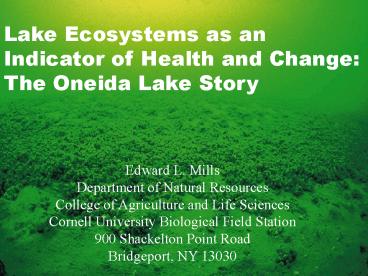Effect of Zebra Mussels - PowerPoint PPT Presentation
1 / 74
Title: Effect of Zebra Mussels
1
Effect of Zebra Mussels
Lake Ecosystems as an Indicator of Health and
Change The Oneida Lake Story
Edward L. Mills Department of Natural
Resources College of Agriculture and Life
Sciences Cornell University Biological Field
Station 900 Shackelton Point Road Bridgeport, NY
13030
2
Oneida Lake
3
ONEIDA LAKE
Drainage Area 1382 sq. mi. Surface Area 80
sq. mi. Length 20.9 sq. mi. Depth maximum
55 ft. mean 23 ft. Watershed Population
(2006) 886,000
4
(No Transcript)
5
Figure 1. Bathymetric map of Oneida Lake.
Created by Jeremy T.H. Coleman (Cornell
Biological Field Station) using ArcView GIS
software, v3.2 (Environmental Systems Research
Institute, Inc.) original data from NOAA chart
interpolation by inverse distance weighting (6
neighbor, 1 power)
6
Measuring Change
Oneida Lake Long-term
Ecological Studies
7
Cornell Biological Field Station
A wonderful lakeside facility
8
Oneida Lake 50 Years of Research
NY Department of Environmental Conservation for
50 years of funding Strong Stakeholder
support Cornell University Support from local,
NYS, federal, and international organizations
9
Oneida Lake-Measuring the Pulse
10
Understanding the Response of Lakes to Large
Global Events
- Invasives
11
Oneida Lake A history of
biotic invasions and crises
12
A Timeline of Invasive Species
in Oneida Lake since the 1820s.
13
Global Influences!!
Zebra mussels
European amphipod
European frogbit
Rusty crayfish
West Nile virus
Largemouth bass virus
14
A Timeline of Invasive Species
in Oneida Lake since the 1820s.
15
Sea lamprey have been quietly killing fish in
Oneida Lake for over a century.
16
Adult lamprey scars on Oneida Lake ciscoes
17
Oneida Lakers and Adult Lamprey
18
East Branch Fish Creek
West Branch Fish Creek
19
Mobile labs apply carefully calibrated stream
treatments. (Photo courtesy Dr. Robert Young)
20
Lamprey abundance indexed from numbers attaching
per hour to the stern of a boat before and after
lamprey control.
Before
After
21
A Timeline of Invasive Species
in Oneida Lake since the 1820s.
22
White Perch
23
Oneida Gill Net Catch
24
A Timeline of Invasive Species
in Oneida Lake since the 1820s.
25
Zebra Mussels
26
Zebra mussels first observed in 1991
27
Effect of Zebra Mussels
Zebra Mussels - Changing the Landscape!
28
Zebra mussel
Populations in Oneida Lake since 1992.
29
Record Water Clarity!!
and changing light
conditions
30
Secchi Disc Transparency
?
Arrow indicates timing of zebra mussel invasion
31
Increase in Aquatic Plants
32
Oneidas Coast in August
33
Oneidas Fall Coastline
34
Oneidas Fall Coastline
35
Oneida Lake Invasive Plants
36
Common Reed or Phragmites
37
Water Chestnut
Water Chestnut
38
Water Chestnut
39
Purple Loosestrife
40
European Frog-bit
41
Eurasian Milfoil
Acentria larva (top) and moth (bottom) US Army
Corps of Engineers
42
Water-borne Diseases
43
Largemouth Bass Virus
44
Largemouth Bass Virus
Photo courtesy of J. Grizzle
45
Transmission and spread of LMBV
- Present range (Yellow)) includes Eastern United
States.
Distribution of states with LMBV detected
including recent d2005 detection in New York
State and Pennsylvania.
46
West Nile Virus
Mosquito borne viruses
47
VHS - Viral Hemorrhagic SepticemiaNo Record Yet
Walleye Conesus Lake
48
Understanding the Response of Lakes to Large
Global Events
- Invasives
- Global Climate
- Change
49
Duration Ice Cover 1900 112 days 2006 95 days
50
Ice residence time is an average of 17 days
shorter now than in the last half of the 19th
century
51
Oneida Lake and Summer Heat 5 YEAR RUNNING
AVERAGE INCREASING AT A RATE OF 0.04 C/YEAR
(1974-2005) 0.08 C/YEAR (Since 1990)
r2 0.68
r2 0.68
52
Global Climate Change
Bay of Quinte
Y(temp) -24.71 0.0215X(year) N50 r0.386
P0.006
Mean Apr - Sep Water Temperature (0C)
1950
1960
1970
1980
1990
2000
(After Casselman)
53
Economic Benefits of Managed Ecosystems
Nutrient Management
54
Lots spent on municipal waste treatment
improvements
55
Water quality improvements and a decline in
total phosphorus.
56
Phosphorus Fish fishing?
57
Oneida Lake Fishing Recreation
58
Economic Benefits of Managed Ecosystems
Walleye and Yellow Perch
59
The Role of Research Forecasting Future Walleye
Populations
60
Smallmouth bass
61
Smallmouth bass gill net catch
62
Oneida Lake Enriching the Central New York
Region
http//www.rochesterbassmasters.com/images/picture
s/tournamentpics/on6.jpg
63
Oneida Lake Enriching the Central New York
Region
64
Economic Benefits of Managed Ecosystems
The Double Crested Cormorant
65
Some chemicals were restricted or banned from use
- Aldrin and Dieldrin
- PCBs
- DDT
- Toxaphene
66
(No Transcript)
67
(No Transcript)
68
Cormorant Stomach Content 10/09/96
69
Double crested cormorants in Oneida Lakehazing
vs no hazing
?
No Hazing
Hazing
?
70
A recovering walleye/ yellow perch sport
fishery???
71
Walleye
72
Yellow perch adult population
73
Conclusions
- Understanding the Response of
- Lakes to Large Global Events
- Economic Benefits of Managed
- Ecosystems
- ?
74
Thanks Much!































